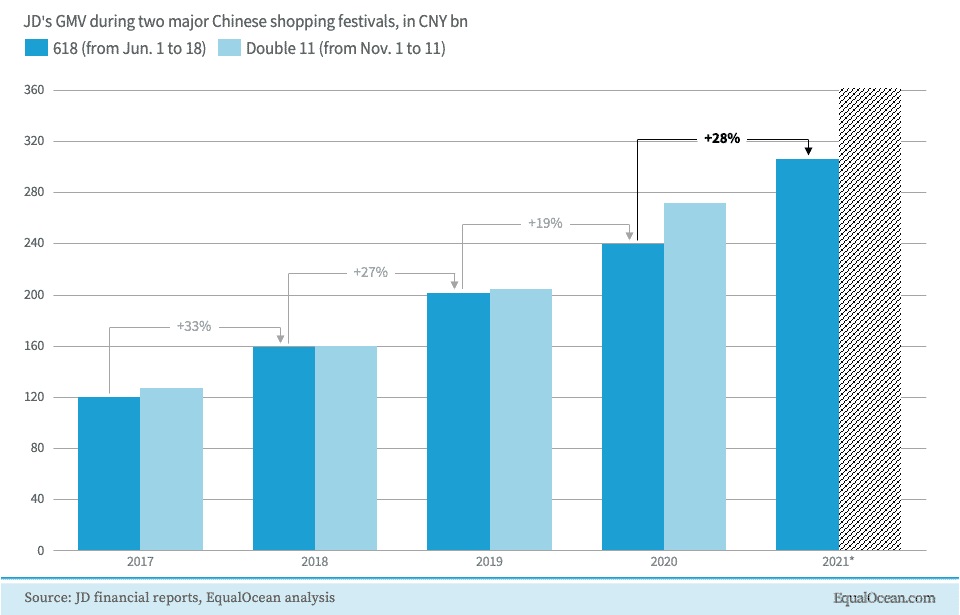Shopping festivals are a popular feat in China. They drive huge amounts of sales that reach billions, and create remarkable online engagements during their run. Moreover, these festivals aren't just one-time big-time events. You can think of them as the shopping equivalent of holidays, happening all-year round.
China’s annual E-commerce festivities
Among the most popular of all is perhaps the Double 11 or Singles Day, held by China's own retail giant—Alibaba. In a 2021 report, Alibaba has gained 85.4 billion USD from its November 1 to 11 run. According to Alibaba, this translated to a 14% sales growth.
Singles Day has become so popular it has invited pop icons such as Taylor Swift to grace its event. in 2019, Taylor Swift joined the Singles Day event by singing some of her songs from her album, Lover. That appearance raked in a large sum of 43 billion USD in just 24 hours for Alibaba. As Singles Day continues to invite other US celebrities, including Kim Kardashian and Katy Perry, international luxury brands have also started to join China’s T-Mall to participate in this iconic Double 11 sale.
There's also the 618 festival started by JD.com. This mid-year sales event is considered to be the second largest online shopping event in China. According to the data observed by Syntun, during the 2022 China 618 Shopping Festival (from 20:00 on May 31st to 24:00 on June 18th), the GMV of the major e-commerce platforms (only including traditional e-commerce platforms and live streaming e-commerce platforms) was 103.08 billion USD.
And just before each year ends, Chinese online businesses have now taken advantage of the season of gifting by launching their own annual 1212 event also known as the Double 12 sale. This event is patterned after the annual Double 12 sales event done by other Southeast Asian shopping sites, such as Lazada and Zalora to take advantage of the Christmas season. In China, the 1212 event has recently picked up, amounting to a 10% year-on-year growth as reported by JD.com and a staggering 310% sales increase in beauty products as reported by Pinduoduo.
How these festivals shape consumer behavior
In general, you can see that these events are rooted in specific occasions or social phenomena recognized and currently popular in China. Because of their social relevance, China’s shopping festivals have become tied with calendar holidays so that it would be easier for customers to anticipate them. Sales that fall on random occasions are not as big as these festivals.
These shopping festivals are also carving out unique consumer patterns in other areas.
Studies have shown that during this pandemic, e-commerce sales gained momentum instead of slowing down. JD.com recently published its report on this year’s 618 sales and they’ve noted an uptick in home appliance sales as well as new products and other innovative online services. Their consumers showed interest in niche products that can only be availed during their 18-day promotion such as mystery boxes, gaming mobile phones, and smart products for pets. It seems users have become more used to e-commerce shopping that they no longer wait for annual sales events to purchase their necessities or the usuals online.
During the 618 events, JD.com also noted how customers purchased online service features that consumers would typically ignore. It seems customers would like to maximize buying the best features during an ongoing sale, especially something as big as the 618 events. This behavior also reminds businesses that they must improve and maintain quality end-to-end services for their customers while providing some incentives to frequent shoppers.
Interestingly, JD.com’s consumers also posted sales growth for their home appliance products. It grew 32.6% year on year. It led the 618 Shopping Festival on the JD platform, bannered by a sale on fresh air conditioning sales which amounted to a staggering total of 720%. This drove home appliance sales to the top and has knocked off mobile phones from their No. 1 spot.

It seems that these days online shopping has become such a norm for China’s customers that they no longer wait for the sale to buy what they would normally need. They reserve those big sale events for high-end purchases or those that they need immediately. These products could be considered niche products. Technologies come into play in terms of how consumers are able to find them.
Read more: Consumer trends: 5 unique habits of online shoppers in China
E-Commerce trends that drive sales growth
Driving massive sales growth in numbers, year on year is no light feat. It requires a mix of technology and marketing strategies to capture China’s potent digital ecosystem. Among the top technologies used by these sales, festivals are live streaming in partnership with key online leaders or KOLs.
Livestreaming has become the norm for online annual sales events and in a recent report published by Aventa, it has been found that over 25% of brands have assigned more than 20% of their marketing budget to Douyin 2021. This caused some of the biggest names in China’s entertainment scene to amass billions in sales while live streaming their specific events. As an example, the total sales generated from live streaming shows reached 10.25 billion USD for this year’s 618 promotions which ran from June 1 to 18.
Livestreams are effective for both consumers and business owners. They serve as a straightforward way of getting product information for consumers. They also make real-time reviews of what customers are interested in to show business owners.
Aside from live streams, AI technologies have also helped forward e-commerce businesses by supporting their supply chain management and improving overall logistics. To keep up with customer demands and at the same time be part of their marketing strategy, e-commerce businesses have integrated AI into their supply chain management to guarantee next-day deliveries for most items regardless of the customer’s location.
E-commerce sites have also implemented chatbots, which is a form of AI, to take care of customer support services in real-time.

Such AI strategies have proven to be worthwhile investments because they’ve helped reduce carbon emissions too. These technologies have also allowed medium to smaller brands to participate in these sales events because they can operate with small manpower in the background. It has allowed businesses to provide end-to-end sales experience suited to a specific customer’s preferences.
Speaking of preferences, the advancement of cashless payments using credits and e-vouchers has also fueled this strong digital economy in China’s e-commerce businesses. Some businesses even use these e-vouchers way ahead of these annual sales events to drive growth into their other marketing events. Cashless payments have evolved to in-app payment transfers, such as in WeChat, to provide people the ability to instantly pay for their purchases and even avail of some time-sensitive promotions while shopping in-app.
To keep up with peak demands of high traffic, companies like Alibaba have introduced cloud-based servers, similar to the hosting services introduced by Amazon. This allows online businesses, especially e-commerce sites, to service customers worldwide in real-time. It also allows businesses to host server-based apps, both for staging and deployment to customers. In its most recent update, Alibaba even introduced its own chipset—the new Yitian 710 server chips to strategically separate its computing services from that of hosting. Among their plans is to use these new chips to separate their storage-based cloud servers from those that could cater to AI services.
Read more: How to improve SaaS performance in China
Technologies that make shopping festivals possible in China
Chinese consumers' buying habits are not the only thing that has changed with the pandemic, and so have their expectations regarding the consumption of digital services.
The average user has little idea of the impact of shopping festivals on the response time of e-commerce sites or the load on servers during peak hours. In fact, it could be argued that the expectations created by marketing campaigns make users even less tolerant of slow pages or poor quality streaming.
If we were talking about any other part of the world, possibly the most efficient solution would be to scale services in the public cloud during the holidays. But we are talking about China, where the Great Firewall and strong online traffic controls make this solution unfeasible.
Now, leaving aside China's restrictions for a moment, let's focus on the technologies and strategies that make shopping festivals in China possible. What would be the optimal strategy?
Cloud computing. The volume of operations performed by e-commerce sites during festivals as well as the low latency required for streaming during peak hours makes it imperative to use a cloud-based solution. Only this technology allows scaling the load both horizontally and vertically as required to maintain an optimal user experience.

Kubernetes. Kubernetes (K8s), the open-source container orchestration system, is hands down the best alternative to manage modern applications at scale. Moreover, since K8s are designed to offer maximum flexibility, they can be customized to fit any type of environment. It is because of this flexibility and customizability that you can use Kubernetes to implement mixed solutions, such as hosting a private cloud inside China and a public cloud offshore in order to distribute the load between the two.
Hybrid hosting. Platforms like Kubernetes are designed to scale horizontally and vertically, distribute loads between public and private clouds (hybrid cloud), and distribute loads between different public clouds (multi-cloud). However, beyond the technical challenges of configuring K8s for these tasks, there is an even bigger challenge: Chinese regulations. To host a website within China, your organization requires an ICP license, a process that can be complex. In addition to the license, you will need to optimize your website to work optimally with local search engines and other components of the Chinese digital ecosystem. This requires multiple adjustments as well as the installation of third-party software to provide an optimal user experience. Despite all these drawbacks, hosting your website within China has huge benefits, such as low latency, ease of scaling your applications within the cloud, and better compatibility with Chinese applications and websites. This does not mean that you cannot implement a hybrid multi-cloud topology, using servers in nearby areas such as Taiwan, Hong Kong, Japan, and Singapore.
To learn more about how GoClick China can help you in the complex process of hosting your website in China, we suggest you read our article Choosing the best hosting for your China website.
Finding the right technologies for your business
If you hope to break into this very potent digital ecosystem, especially in e-commerce, then you must devote resources to picking the right technologies for your website.
On top of these technologies, you also need to beef up your website to make sure that it fits China’s strict Internet guidelines as well as relevant to China’s huge consumer market. To ensure this, you must implement the right optimization techniques on your web pages as well as maintain your website’s performance through constant testing.
When it comes to testing and monitoring your website’s performance, it is crucial to be able to regionally test your website to ensure that it works in most regions in China. Partner with an agency on the ground that can provide end-to-end solutions for your online business, with marketing strategies fit for your target market. Make sure that your agent knows the latest techniques that can help you capture the digital market in China.



